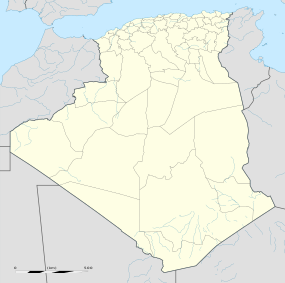Timgad
| ⵜⵉⵎⴳⴰⴷ | |

Trajan's Arch within the ruins of Timgad.
|
|
| Alternate name | Thamugas Thamugadi |
|---|---|
| Location | Batna Province, Algeria |
| Coordinates | 35°29′03″N 6°28′07″E / 35.48417°N 6.46861°ECoordinates: 35°29′03″N 6°28′07″E / 35.48417°N 6.46861°E |
| Type | Settlement |
| History | |
| Founded | c. 100 |
| Abandoned | 7th century |
| Periods | Roman Empire |
| Official name | Timgad |
| Type | Cultural |
| Criteria | ii, iii, iv |
| Designated | 1982 (6th session) |
| Reference no. | 194 |
| State Party | Algeria |
| Region | Arab States |
Timgad (called Thamugas or Thamugadi in old Berber) was a Roman-Berber town in the Aurès Mountains of Algeria. It was founded by the Emperor Trajan around AD 100. The full name of the town was Colonia Marciana Ulpia Traiana Thamugadi. Trajan commemorated the city after his mother Marcia, eldest sister Ulpia Marciana, and father Marcus Ulpius Traianus.
Located in modern-day Algeria, about 35 km east of the town of Batna, the ruins are noteworthy for representing one of the best extant examples of the grid plan as used in Roman city planning.
In the former name of Timgad, Marciana Traiana Thamugadi, the first part - Marciana Traiana - is Roman and refers to the name of its founder, Emperor Trajan and his sister Marciana. The second part of the name - Thamugadi - "has nothing with latin". Thamugadi is the Berber name of the place where the city was built, to read Timgad plural form of Tamgut, meaning "peak", "summit".
The city was founded ex nihilo as a military colony by the emperor Trajan around AD 100. It was intended to serve primarily as a bastion against the Berbers in the nearby Aures Mountains. It was originally populated largely by Roman veterans of the Parthian campaigns who were granted lands in return for years of service.
The city enjoyed a peaceful existence for the first several hundred years and became a center of Christian activity starting in the 3rd century, and a Donatist center in the 4th century.
...
Wikipedia

